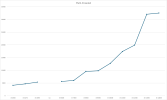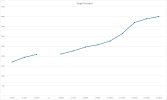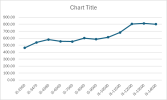SAFCasper
Well-Known Member
- Reaction score
- 804
- Location
- United Kingdom
Some data I was messing around with and thought others might find interesting
CPU benchmark numbers taken from Passmark for generation 2 through 14. These aren't flagship models I have purposely selected desktop i5's you would find in a mid-range OptiPlex/EliteDesk/ThinkCentre.


Some notes to go with...
- 5th gen was laptop only, hence the blank
- 8th gen changed to 6c/6t. Every generation previous was 4c/4t
- 10th gen enabled hyperthreading for i5 making it 6c/12t
- 13th gen introduced an additional 8 efficient cores hence the massive multi-threaded performance increase.
CPU benchmark numbers taken from Passmark for generation 2 through 14. These aren't flagship models I have purposely selected desktop i5's you would find in a mid-range OptiPlex/EliteDesk/ThinkCentre.


Some notes to go with...
- 5th gen was laptop only, hence the blank
- 8th gen changed to 6c/6t. Every generation previous was 4c/4t
- 10th gen enabled hyperthreading for i5 making it 6c/12t
- 13th gen introduced an additional 8 efficient cores hence the massive multi-threaded performance increase.

